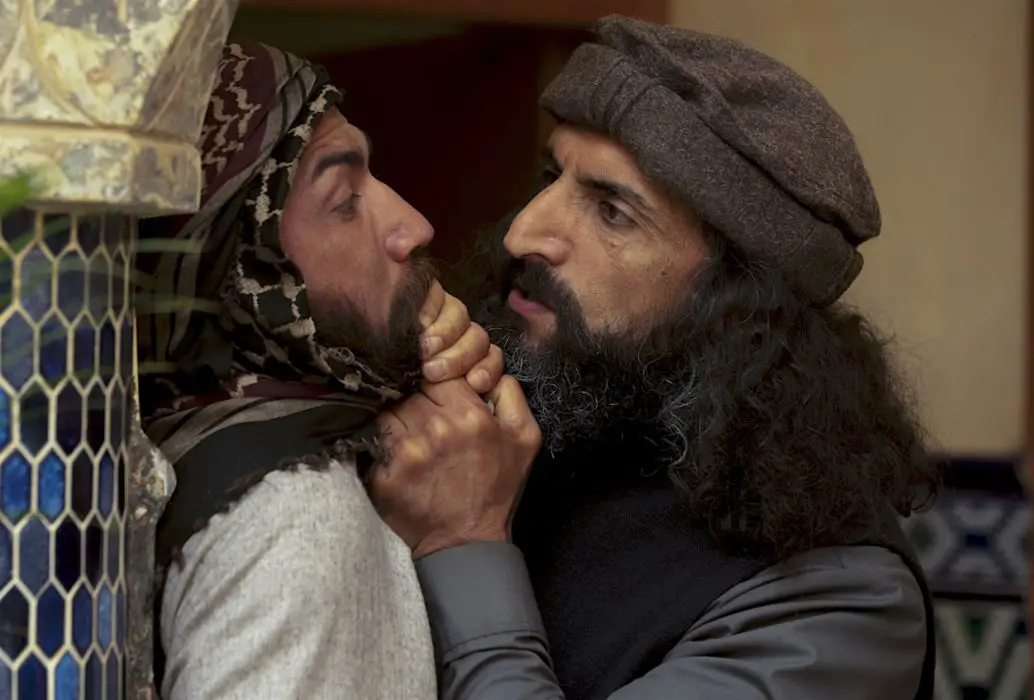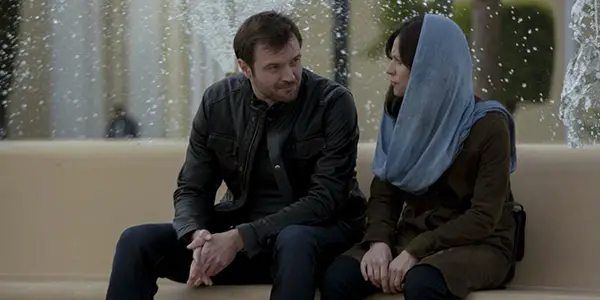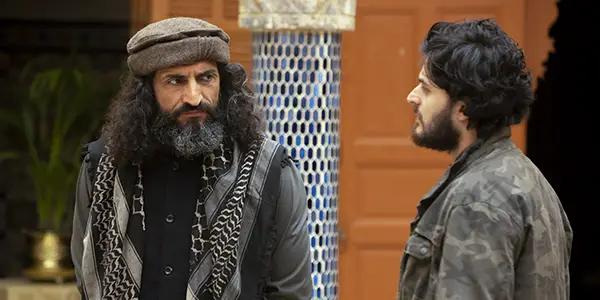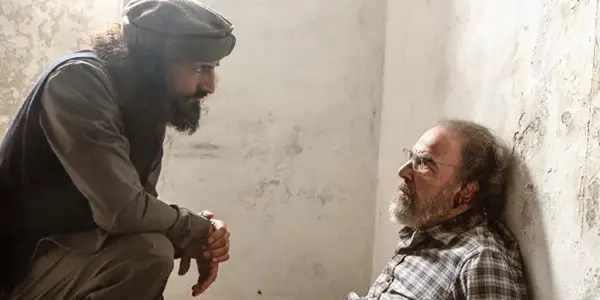Homeland (S8E3) “False Friends”: New Highs & New Lows

Digital Media Program Coordinator and Professor at Southern Utah University…
In an episode that somehow pulls at the reigns while simultaneously cracking the whip, Homeland viewers are pulled back and forth between compelling choices and questionable ones. Heroism is being defined in unconventional ways here, a celebration of diversity from a show that’s been criticized for its lack of the same. The writers and showrunners seem aware of and willing to comment on the show’s former failings, but the question of how they will rise to overcome those failings is still an open question.
Episode Summary
False Friends opens with a highly stressed Carrie (Claire Danes) shakily taking long drags from a cigarette as she struggles with her anxiety-inducing flashbacks, combined with her recent second sighting of Yevgeny Gromov (Costa Ronin). She remembers that during her time in captivity, she latched onto him, but can’t remember why. She tells Mike Dunne (Cliff Chamberlain), Station Chief in Kabul, where Carrie is assigned, that Gromov has made his presence known. Before long, Carrie receives another note from Gromov, this time requesting a meeting.
Throughout the episode, the viewer is given some insight into Dunne’s motivations. When Carrie was first assigned to him back in the season’s first episode, he received a call from fellow agent Jim Turrow (David Hunt), who suspected that Carrie’s failing her polygraph test was evidence that she had possibly been compromised by the Russians during her time in their captivity. We learn in this episode that Mike has been trying to find evidence to implicate Carrie since the day she arrived. Carrie, it seems, is at least partially aware of his motivations: when she goes to meet Gromov at the requested time and place, she suspects that Mike and a team are watching her. She and Gromov take steps to avoid being heard.

During this meeting, Gromov apologizes for having mistreated Carrie, implying that his anonymous tip was “penance” for his actions. Carrie accuses him of knowing more than he’s letting on, but Gromov maintains that such is not the case, that he’s “trying to pick up where we left off.” He reveals that he saved her life when she tried to hang herself in captivity. He makes himself out as a benevolent captor, explaining that he got meds for her when he could, although we know from the end of season 7 that he intentionally kept those meds from her as part of her torture. Carrie, it seems, remembers very little of what Gromov did or didn’t do during that time.
During all of this, Saul (Mandy Patinkin) convinces Haqqani (Numan Acar) that they’re on the same side. Haqqani learns that his son, Jalal (Elham Ehsas), informed the ISI of his meeting with Saul, which resulted in the attempt on his life. Consequently, he throws Jalal out of his home, and out of the Taliban (or whatever portion of it he still controls). Saul and Haqqani agree, finally, to a cease fire. The episode ends with Jalal being picked up by Qureshi (Nimrat Kaur), a pair that will likely become a principle antagonist for the show’s remaining episodes.
Homeland‘s Final Season
While False Friends is easily the weakest of season 8’s three episodes, Homeland remains stunningly well-crafted television. The various political threads are still furiously spinning, creating the illusion of unhinged chaos, and yet, the show is careful to drop hints indicating that some single figure must be behind everything. Despite Gromov’s appeal to Carrie’s sympathetic understanding, Russia is still the most likely puppeteer.
Indeed, the meeting between Gromov and Carrie seems pointless on the surface; absolutely nothing of political significance is shared in the words exchanged. The subtext of Gromov’s manipulation, however, is palpable. We know very little of what really happened during Carrie’s confinement, but Gromov is clearly trying to find his way into Carrie’s good graces. Either his supposed sincerity is a ruse, or viewers are the victims of bad writing, with a potentially juicy story arch being discarded as soon as it’s introduced. Knowing Homeland‘s reputation on deftly handling these various story threads, however, I’m betting on the former.
Hero Haqqani
The most compelling story arch of episode three is that of Haissam Haqqani. This particular storyline is given a bit of a rough start: as the episode opens, Haqqani is of the belief that United States Intelligence forces were behind the attempt on his life. That’s why he captured Saul. However, in a single scene far too brief for its implications, Saul is able to convince Haqqani that someone within his own inner circle was behind the betrayal. Haqqani realizes that his son, Jalal, is the most likely suspect.
Meanwhile, Jalal is meeting with Qureshi, the power behind the ISI and by extension, the assassination attempt. During this meeting, the pair receive the unwelcome news that Haqqani survived. Jalal goes to see him, and while there, makes a serious mistake by trying to call Qureshi on an open line. Haqqani, tapped into the phones, hears the call.
Haqqani understands his son’s position and ideology, but is also war-weary enough to have become something of a realist. He tells Jalal: “Another Islamic Emirate of Afghanistan will be never won on the battlefield,” that “the West won’t allow it.” In a brilliant line, easily the pinnacle of the episode, he explains: “We are just strong enough never to lose, and just weak enough never to win.”

In the end, Jalal admits that he believes his father to have lost his way. His heart broken, Haqqani speaks with sympathy to his son, asking for his help. “Will you join me on this new path?” Jalal replies: “I will try. For you.” For a moment, viewers are touched by what seems to be a powerful moment of reconciliation. However, things quickly turn south when Jalal maintains his innocence, despite Haqqani knowing otherwise. Choosing his words carefully, Jalal says: “I have done nothing wrong.” Faced with an impossible choice, Haqqani is unable to pull the trigger, and instead has Jalal thrown out. Later, after agreeing to Saul’s terms for a cease fire, Haqqani reveals that he believes letting Jalal go may have been a serious mistake.
Now sure of his son’s guilt, Haqqani releases Saul from captivity. Saul remains with him, however, and becomes something of a confidante. During a particular conversation, he tells Saul he’s thinking of stepping down. “Don”t do that,” Saul says, insisting that Haqqani, “the Arrow of God” as his men call him, is the only person who can stop this war.
In no uncertain terms, Saul tells Haqqani that he is a hero. This presents an intriguing argument. The leader of the Taliban being called a hero. The Taliban is an organization with a sympathetic cause (considering the continuing oppression to which the organization feels duty-bound to respond), but a murderous past. Are the writers planning to have Haqqani, rather than an American character, be the hero to end this war? Most likely not, but there’s no doubt that such an outcome would be an extremely powerful statement.
Character Problems
One character that has been conspicuously absent thus far into season 8 is the new President, Ralph Warner (Beau Bridges). We’re finally given a glimpse into his administration in this episode, as the White House is briefed on Saul’s capture, and later, his release. During all of this, Warner’s Chief of Staff, David Wellington (Linus Roache), delivers the unfortunate news that Vice President Ben Hayes (Sam Trammell) may be trying to subvert his presidency. It’s revealed that Warner chose Hayes from across the aisle, as part of an effort to bring the divided country closer together. However, as Wellington says: “Those fault lines run deep. They’re still active.”
Despite the adept handling of the show’s various subplots, Homeland‘s character problems remain, and we’re seeing very little indication that any changes will be made on this front. The show continues to suffer from something of a split personality, one in which complex and compelling political threads are woven in with characters that really have no legitimate place in the country’s most sensitive intelligence circles. A particular scene in False Friends is such a perfect representation of this problem that it’s almost laughable.
Toward the end of the episode, after Saul’s successful negotiation of the cease fire with Haqqani, he and Carrie are speaking to President Warner and David Wellington over a secure video connection from Kabul. The president greets her as though she’s something of a hero. The scene then evolves into a succinct explanation as to why this whole plot, both of the episode and the season as a whole, is so sticky and convoluted, compellingly so on the political side, but ridiculously so on the character side. Carrie says: “The prospect of ending our longest war would enjoy broad support.” But Wellington wisely replies: “Not when it’s twisted into a partisan issue making it look like we’re capitulating to terrorists.”

In Wellington’s line is revealed the show’s entire political commentary: a reflection of real-world partisanship, a problem that seems to have become so ingrained into our country’s foundations as to be unavoidable, destroying any hope of real progress. This brilliant line is basically a cameo for the writers’ room. So obvious was the removal of the curtain that while watching this scene, I found myself wondering if they’d just break the fourth wall and dismiss any charade of “fictional representation.”
Advising The President
But then, somehow, they found a way to shock viewers even more by going from brilliant to absurd in mere seconds. The President of the United States, having just met Carrie, and surely having been briefed on her many misadventures, asks her for ideas, referring to her as one of the “architects” of this cease fire. First, Saul was the one principally behind the cease fire. Second, Carrie Mathison, more destructive than any tornado, being asked by the most powerful people in the world for her opinion on the highest matters of national security, with barely a modicum of effort to even suggest some type of hesitation on their part, is flatly preposterous. In previous seasons, the writers have at least bothered with some minimal plot points borne of at least a little hesitation toward Carrie by whichever political leader was currently in office.
The advice Carrie gives in response to Warner’s request is equally cringe-worthy. She recommends that the President take a surprise trip to visit the military stationed in Afghanistan, and hold a joint press conference with the country’s President at the Arg Palace. “Win over the military, and you’re halfway there.” Clearly, her suggestion has real-world examples, so that much, at least, makes sense. My question is, why is it that a field agent who, by her own admission, knows nothing about the delicate nature of political maneuvering, is the one to suggest this, rather than someone like Wellington, who has made a career out of addressing exactly this type of situation? This entire moment feels more out of place than a dolphin in a desert.
Another moment of supposedly clever elbow nudging from the writers is found in the first scene in which we encounter the new President and his staff. Warner’s Vice President, Ben Hayes, is a newly introduced character, and therefore represents a perspective untainted by prior relationships with the show’s main characters. When presented with the information that Saul has been captured in Peshawar, Hayes asks a perfectly reasonable question: “How many red lights are we gonna let this guy run?” However, the writers choose to make him look the fool in his comments, and based on subsequently revealed details about Hayes, will likely make him into a villain. This constitutes a subtle jab at the more discerning viewer, who calls attention to the blatantly ridiculous and dangerous schemes these characters are allowed to run. Sure, it makes for a good story, but are we foolish for calling out such cheap writing tactics, especially when we’re thrown back and forth between brilliant political plot points, and eyebrow-raising character moments? It’s a wonder Homeland viewers don’t have whiplash.
“False Friends”: Conclusion
False Friends is a more of the same from Homeland‘s crew, and in terms of crafting a political thriller, that’s a very good thing. In terms of the show’s main characters, however, it’s not. Claire Danes and Mandy Patinkin continue to be astoundingly impressive, however. It’s a testament to the acting prowess of both that they are able to maintain some credibility as characters with such a frankly ridiculous premise. In the end, however, it all leads to what I hope will be a compelling story despite the problems. How will Carrie’s being compromised play out throughout the final nine episodes? The answer is sure to bring with it a hell of a whirlwind. I look forward to what I’m sure will continue to be a compelling conclusion, despite Homeland‘s continuing flaws.
Homeland Season 8 Episode 3: False Friends, aired on February 23, 2020, on Showtime.
Does content like this matter to you?
Become a Member and support film journalism. Unlock access to all of Film Inquiry`s great articles. Join a community of like-minded readers who are passionate about cinema - get access to our private members Network, give back to independent filmmakers, and more.
Digital Media Program Coordinator and Professor at Southern Utah University and Southwest Technical College; M.Ed.; Author at Labyrinth Learning and Film Inquiry. Passionate educator of film theory and history. World-class nerd with a wide array of interests and a deep love for many different fandoms.













